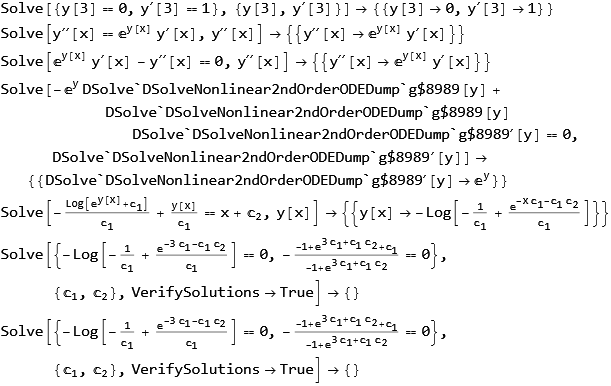Fyi, report to WRI as suggedted. [CASE:4956902]
This ode is similar to one here but for some reason DSolve could not able to solve this. This ode is from a textbook
My question is: What is the reason it can't solve this since it is similar to the one in the above link, and any workaround to make DSolve solve this one?
I solved by hand below as well. I used the Trace commands by Michael E2 from the above answer, but it did not help me figure where it went wrong and I am not good at internal tracing of Mathematica functions.
Code
ClearAll[y, x];
ode = y''[x] == y'[x]*Exp[y[x]];
ic = {y[3] == 0, y'[3] == 1};
DSolve[{ode, ic}, y[x], x]
(* {} *)
The solution it should have given is y[x]->-Log[4-x] as shown below.
Verification of solution
mysol = y -> Function[{x}, -Log[4 - x]]
ode /. mysol

ic/.mysol

Hand solution
\begin{align*} y^{\prime\prime} & =y^{\prime}e^{y}\\ y\left( 3\right) & =0\\ y^{\prime}\left( 3\right) & =1 \end{align*} Let $p=y^{\prime}$, then $y^{\prime\prime}=\frac{dp}{dx}=\frac{dp}{dy}\frac{dy}{dx}=\frac{dp}{dy}p$. The ode becomes \begin{align*} \frac{dp}{dy}p & =pe^{y}\\ \frac{dp}{dy} & =e^{y} \end{align*} Which has the solution \begin{equation} p=e^{y}+c_{1}\tag{1}% \end{equation} Using initial conditions given by $p\left( 3\right) =1,y\left( 3\right) =0$ the above becomes $$ 1=1+c_{1} $$ Hence $c_{1}=0$ and the solution (1) simplifies to \begin{align*} p & =e^{y}\\ \frac{dy}{dx} & =e^{y} \end{align*} This is separable. $$ e^{-y}dy=dx $$ Integrating gives \begin{equation} -e^{-y}=x+c_{2}\tag{2} \end{equation} But $y\left( 3\right) =0$, hence $$ -1=3+c_{2} $$ Therefore $c_{2}=-4$ and (2) becomes \begin{align*} -e^{-y} & =x-4\\ e^{-y} & =4-x\\ -y & =\ln\left( 4-x\right) \\ y & =-\ln\left( 4-x\right) \end{align*}
Attempt at Tracing using Michael E2's code
ClearAll[y,x];
ode=y''[x]==y'[x]*Exp[y[x]];
ic={y[3]==0,y'[3]==1};
Trace[DSolve[{ode,ic},y[x],x],s_Solve:>HoldForm[s]->s,TraceInternal->True]//Flatten//Column


ode = y''[x] == y'[x]*Exp[y[x]]; ic = {y[3] == 0, y'[3] == A}; sol = DSolve[{ode, ic}, y[x], x]; Limit[y[x] /. First@sol, A -> 1]. $\endgroup$